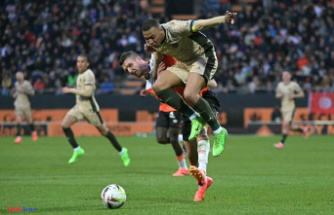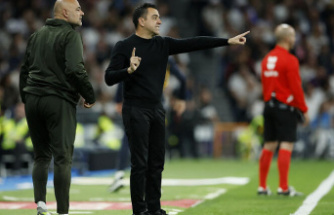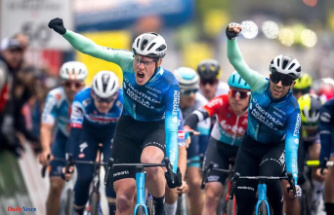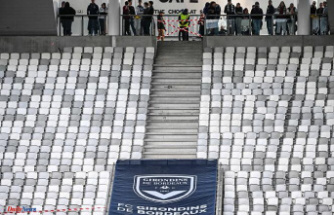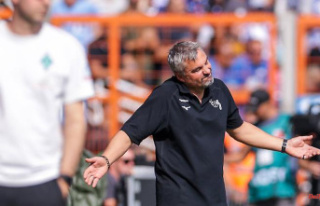Robert Lewandowski returns to the Allianz Arena on Tuesday evening. The second group game in the Champions League is very important for Julian Nagelsmann and FC Bayern Munich, because depending on the outcome, the record champions face the first crisis of the season.
These are unusual times at Bayern Munich. Unusual because the record champions in the Bundesliga, despite three wins, have now drawn three in a row. The initial euphoria has turned into a slight mood of crisis. But also unusual because Hasan Salihamidžić was in a mild mood in the Sport1 double pass. When in doubt, results come second, said the sports director: "I'd rather play a draw again than have a bad mood and a lot of dissatisfied players."
There were times with the record champions when coaches were criticized even after narrow victories. Carlo Ancelotti, for example, started the new season in 2017 despite being in the championship. Niko Kovac even won the double in 2019 and still faced criticism.
Julian Nagelsmann is now on the sidelines - and his "learning process", as Salihamidžić described it, is being supported. Nagelsmann is a promising coaching talent who won the championship in his first year. Bayern also paid a transfer fee, which according to various speculations is said to be between 15 and 25 million euros. After initial euphoria, the 35-year-old was viewed very critically, especially in the second half of the season. At the latest after the quarter-finals in the Champions League against FC Villarreal, he became the center of a debate about the lack of consistency at FC Bayern.
There were many criticisms of him. Too little rotation, lack of excitement in games against supposedly smaller opponents, too many system changes, too many adjustments to the opponents, an inappropriate role for star striker Robert Lewandowski - there was almost nothing that Nagelsmann was not accused of.
At the same time, there were factors that relieved him. The long absences of Joshua Kimmich, Alphonso Davies and Leon Goretzka, for example. In the spring, Bavaria also lost its rhythm due to corona cases and no longer seemed to find it properly. The squad was therefore a big topic. Could Nagelsmann simply not add enough? So did he have to experiment?
That's probably part of the truth. Accordingly, all observers were excited to see what FC Bayern would conjure up on the pitch this season. The people of Munich grabbed the transfer market like they hadn't for a long time. Sadio Mané, Matthijs de Ligt, Mathys Tel, Ryan Gravenberch, Noussair Mazraoui - a lot of quality came to Munich.
But the discussions started all over again in mid-September. Again, some focus on Nagelsmann. And the squad factor? It really shouldn't matter anymore. Actually. Because against Stuttgart, according to a new accusation, the coach rotated too much. Hence Salihamidžić's statement that he didn't want dissatisfied players under any circumstances. The squad is wider than it has been for a long time.
Goretzka, for example, self-confidently and publicly made claims after his return. "But now I'm ready to start," said the international after the 2-0 win against Inter, in which he came on as a substitute after 61 minutes. He put Nagelsmann under additional pressure.
Goretzka was in the starting XI against Stuttgart. Although Gravenberch made a very good impression in the DFB-Pokal, there was no doubt that the ex-Schalke player would start. A natural process in the hierarchy of FC Bayern or more? On Monday, several media reported the first small unrest inside the cabin.
"He's just finding his style," Salihamidžić said of Nagelsmann: "He's never had a squad like this before." Remarkable tones from a sports director who at the same time expressed that the performance at the weekend was "too little". It seems as if FC Bayern is caught somewhere between Nagelsmann's learning process and their own demands. The question will be how long the players will support this.
Everything looked so good at the start of the season. Nagelsmann insisted during the summer break that he had learned from his mistakes of the past season. He wants to worry less about what's going on with the opponent and prefer to focus on his own strengths. In the first few games, Bayern not only started with the same starting eleven, but also consistently with the new 4-2-2-2.
A formation that seems to optimally combine the strengths of the players with the ideas of the coach. Because Nagelsmann is a coach who attaches great importance to a tight positional game. Even the outside players often move in. The aim of this is that the player with the ball has a great potential for combinations in the dangerous zones. At the same time, many players are close to the ball so that they can counter press immediately if the ball is lost.
Last season, Robert Lewandowski complained that it was taking away his space. But now, with the departure of the Pole, Nagelsmann has the freedom to let his imagination and ideas run free. After the first few weeks, this was seen as a great opportunity.
Bayern played furiously in the Supercup against Leipzig (5:3), in the Bundesliga against Frankfurt (6:1), Wolfsburg (2:0) and Bochum (7:0). Even in the 1-1 draw against Borussia Mönchengladbach, the Munich team impressed with great attacking football. But then the worm was in there. Nagelsmann already switched to a 4-2-3-1 against Union Berlin (1:1), and he stayed with it against Inter (2:0) and Stuttgart (1:1).
Since then, Bayern have found it harder. Did you find the cause? Probably not. The differences are marginal because the offensive players behave similarly to 4-2-2-2. However, if further adjustments are made as a result of the rotation, the changes may already be too large.
Goretzka is a good example of this. The 27-year-old likes to play his role in midfield more aggressively. He also appeared more often in the third attack against VfB Stuttgart. Marcel Sabitzer has played differently in recent weeks. The Austrian acted more as a safeguard for Joshua Kimmich. As a result, the latter had more opportunities to use his qualities on the offensive and to push forward more aggressively when pressing.
This double six seemed to do Bayern good. But Goretzka's claims could stand in the way - if the Bochum native cannot or does not want to adapt tactically. Originally, the English weeks were seen as a saving grace for Nagelsmann. But now that they're there, it's clear why the coach didn't rotate more in the first few games.
The second suit isn't sitting yet. And until he sits, a few weeks could pass. Weeks where earnings crises would make matters worse. The more draws or even defeats, the more it gnaws at FC Bayern's self-image.
The time for black painting is far from over, said Salihamidžić. Despite all the criticism, that would be too early. It was actually foreseeable that the conversion to a system without real nines would take time. It was also foreseeable that some newcomers would find their way into the team more quickly, while others were just starting out.
And so the supposed crisis is possibly only a temporary straw for national competition to cling to. But it is also a fact: When Lewandowski returns to the Allianz Arena on Tuesday (9 p.m./Amazon Prime Video and in the ntv.de live ticker), the slight mood of crisis on Säbener Straße can very quickly turn into a real one. For Nagelsmann, the game against FC Barcelona is of great importance for that reason alone.
(This article was first published on Monday, September 12, 2022.)


